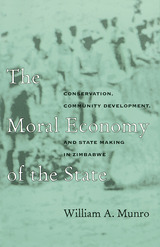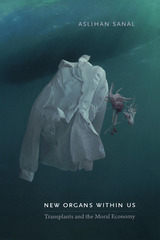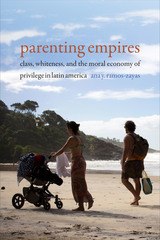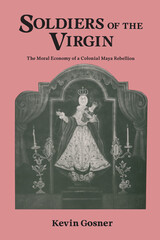4 books about Moral Economy

The Moral Economy of the State
Conservation, Community Development, and State-Making in Zimbabwe
William A. Munro
Ohio University Press, 1998
The Moral Economy of the State examines state formation in Zimbabwe from the colonial period through the first decade of independence. Drawing on the works of Gramsci, E. P. Thompson, and James Scott, William Munro develops a theory of “moral economy” that explores negotiations between rural citizens and state agents over legitimate state incursions in social life. This analysis demonstrates how states try to shape the meanings of citizenship for agrarian populations by redefining conceptions of the public good, property rights, and community membership. The book’s focus on the moral economy of the state offers a refreshing perspective on the difficulties experienced by postcolonial African states in building stronger state and rural institutions.
[more]

New Organs Within Us
Transplants and the Moral Economy
Asl1han Sanal
Duke University Press, 2011
New Organs Within Us is a richly detailed and conceptually innovative ethnographic analysis of organ transplantation in Turkey. Drawing on the moving stories of kidney-transplant patients and physicians in Istanbul, Aslihan Sanal examines how imported biotechnologies are made meaningful and acceptable not only to patients and doctors, but also to the patients’ families and Turkish society more broadly. She argues that the psychological theory of object relations and the Turkish concept of benimseme—the process of accepting something foreign by making it one’s own—help to explain both the rituals that physicians perform to make organ transplantation viable in Turkey and the psychic transformations experienced by patients who suffer renal failure and undergo dialysis and organ transplantation. Soon after beginning dialysis, patients are told that transplantable kidneys are in short supply; they should look for an organ donor. Poorer patients add their names to the state-run organ share lists. Wealthier patients pay for organs and surgeries, often in foreign countries such as India, Russia, or Iraq. Sanal links Turkey’s expanding trade in illegal organs to patients’ desires to be free from dialysis machines, physicians’ qualms about declaring brain-death, and media-hyped rumors of a criminal organ mafia, as well as to the country’s political instability, the privatization of its hospitals, and its position as a hub in the global market for organs.
[more]

Parenting Empires
Class, Whiteness, and the Moral Economy of Privilege in Latin America
Ana Yolanda Ramos-Zayas
Duke University Press, 2020
In Parenting Empires, Ana Y. Ramos-Zayas focuses on the parenting practices of Latin American urban elites to analyze how everyday experiences of whiteness, privilege, and inequality reinforce national and hemispheric idioms of anti-corruption and austerity. Ramos-Zayas shows that for upper-class residents in the affluent neighborhoods of Ipanema (Rio de Janeiro) and El Condado (San Juan), parenting is particularly effective in providing moral grounding for neoliberal projects that disadvantage the overwhelmingly poor and racialized people who care for and teach their children. Wealthy parents in Ipanema and El Condado cultivate a liberal cosmopolitanism by living in multicultural city neighborhoods rather than gated suburban communities. Yet as Ramos-Zayas reveals, their parenting strategies, which stress spirituality, empathy, and equality, allow them to preserve and reproduce their white privilege. Defining this moral economy as “parenting empires,” she sheds light on how child-rearing practices permit urban elites in the Global South to sustain and profit from entrenched social and racial hierarchies.
[more]

Soldiers of the Virgin
The Moral Economy of a Colonial Maya Rebellion
Kevin Gosner
University of Arizona Press, 1992
In the early summer of 1712, a young Maya woman from the village of Cancuc in southern Mexico encountered an apparition of the Virgin Mary while walking in the forest. The miracle soon attracted Indian pilgrims from pueblos throughout the highlands of Chiapas. When alarmed Spanish authorities stepped in to put a stop to the burgeoning cult, they ignited a full-scale rebellion. Declaring "Now there is no God or King," rebel leaders raised an army of some five thousand "soldiers of the Virgin" to defend their new faith and cast off colonial rule.Using the trial records of Mayas imprisoned after the rebellion, as well as the letters of Dominican priests, the local bishop, and Spaniards who led the army of pacification, Kevin Gosner reconstructs the history of the Tzeltal Revolt and examines its causes. He characterizes the rebellion as a defense of the Maya moral economy, and shows how administrative reforms and new economic demands imposed by colonial authorities at the end of the seventeenth century challenged Maya norms about the ritual obligations of community leaders, the need for reciprocity in political affairs, and the supernatural origins of power.The first book-length study of the Tzeltal Revolt, Soldiers of the Virgin goes beyond the conventions of the regional monograph to offer an expansive view of Maya social and cultural history. With an eye to the contributions of archaeologists and ethnographers, Gosner explores many issues that are central to Maya studies, including the origins of the civil-religious hierarchy, the role of shamanism in political culture, the social dynamics of peasant corporate communities, and the fate of the native nobility after the Spanish conquest.
[more]
READERS
Browse our collection.
PUBLISHERS
See BiblioVault's publisher services.
STUDENT SERVICES
Files for college accessibility offices.
UChicago Accessibility Resources
home | accessibility | search | about | contact us
BiblioVault ® 2001 - 2024
The University of Chicago Press









